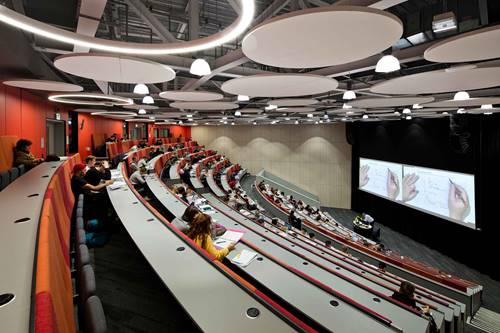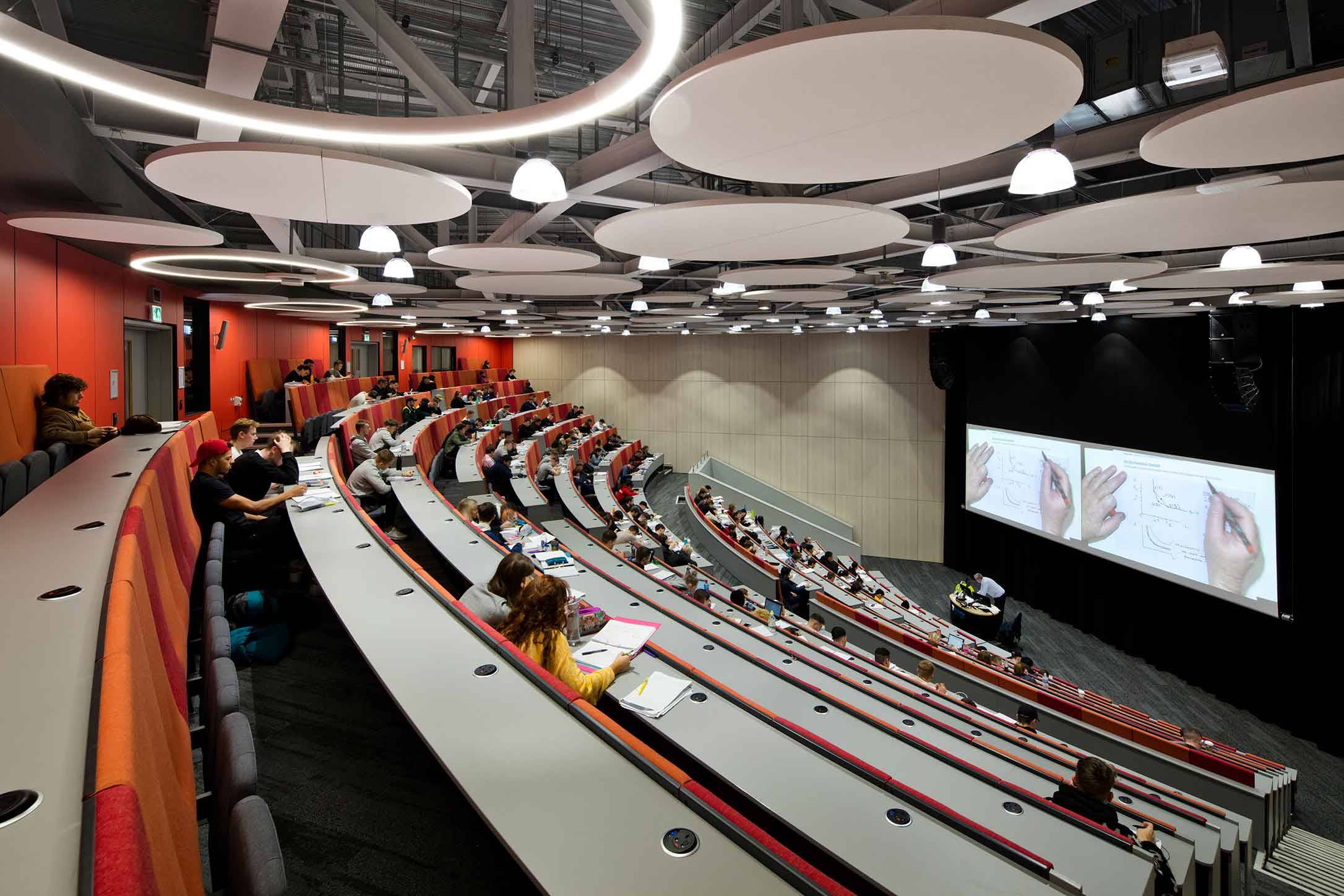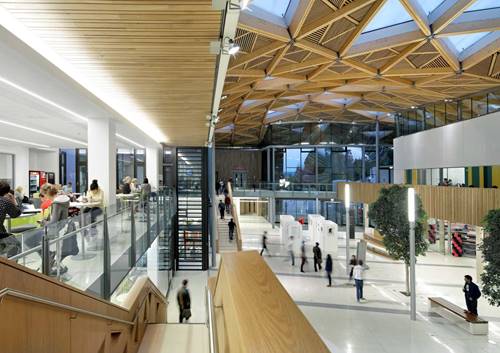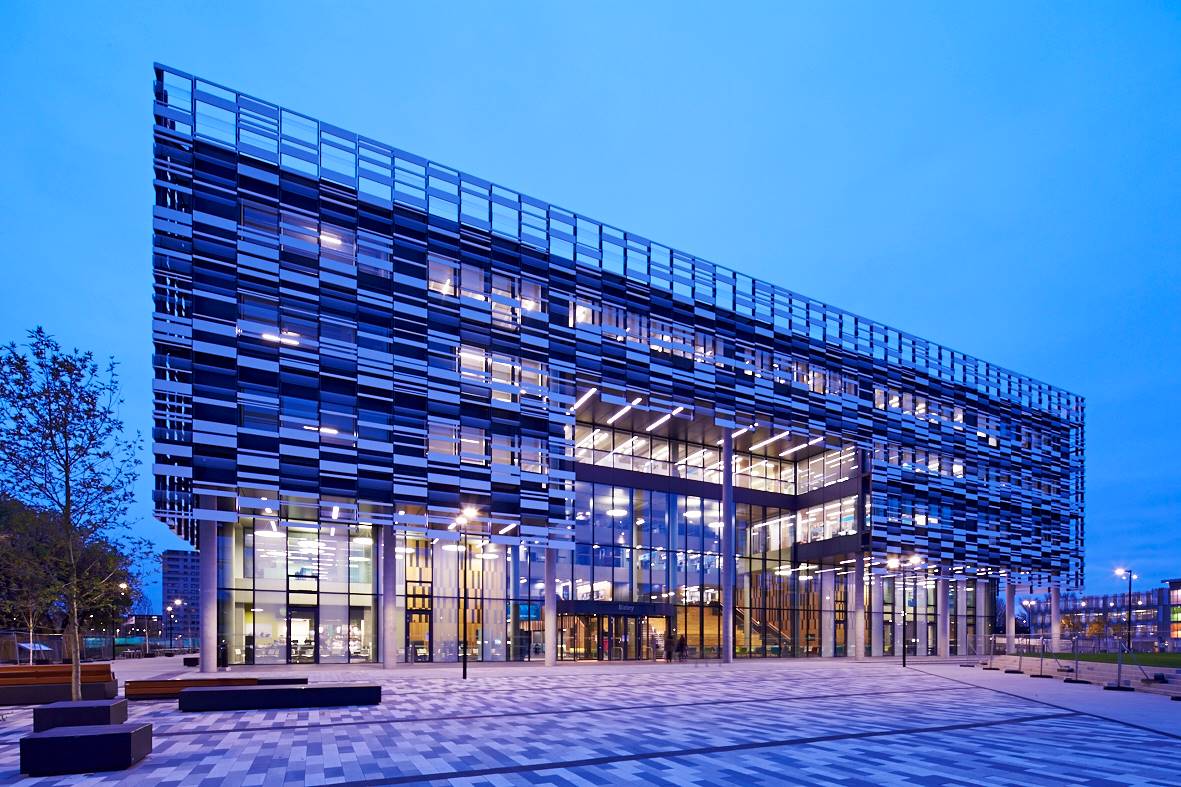This year’s Association of University Directors of Estates (AUDE) Conference took place virtually from 12th-16th April, exploring the theme: Coronacoaster.
After over a year of the Covid-19 pandemic, discussions focused around the biggest questions and challenges that universities will face as they come out of lockdown and the ‘new normal’ emerges. The virtual nature of the event meant that more delegates could participate in the conversations.
We were invited to host a session on Thursday 15th April. Our Education Sector Head, Russell Day, chaired the discussion on the topic: “Large learning spaces: What does the future hold?”, which gathered an impressive panel of experts and was attended by 100 delegates.
To make for a fast-paced and vibrant conversation, each speaker was restricted to a maximum of 15 PowerPoint slides and to spending no more than 15 seconds on each slide.
The participants agreed it was an extremely enjoyable and informative seminar and a topic that may prove worthy of further research and collaboration when it comes to innovating in new and old education spaces – watch this space.
You can watch the full session online now on the Aude website.
I’m intrigued about what the future might bring to large and collaborative learning spaces. So, it was great to be joined by so many expert education architects and academics, to give us their own interpretation and perspectives that suggest direction for tomorrow.
Russell Day
Sir Robert McAlpine, Education Sector Head
Read a summary of the topics discussed below:
Dr Jos Boys, Senior Lecturer in Environments for Learning, UCL, questioned why large learning spaces are needed at all. According to her, the future will feature a hybrid of lecture theatres where live and virtual users can interact. It’s clear we’re moving towards HE ‘mediafication’, where lecturers are no longer the ‘sage on the stage’ but take on Ted Talk characteristics – even acting like influencers. The pandemic has given us the opportunity to sweep away the inertia that has stymied change. She was impressed by how the pandemic has changed learning so quickly into an online ‘connected’ environment and is conscious this is a real opportunity to shape the future.
Emma-Louise Hannigan, Associate/ Education Lead Ireland, HLM Architects, pointed out that large learning spaces haven’t really changed in 1,500 years, with little evidence that they’re good learning environments. They are passive and don’t encourage students to engage. Even before Covid-19, students were voting with their feet and accessing material online, but this online learning must be more sophisticated and move beyond the ‘virtual filing cabinet’. Emma-Louise highlighted how Australia has been leading in these innovations, experimenting with spaces, furniture, technology and group sizes and then analysing feedback – enabling greater group activity. She closed by saying practice makes perfect and in the UK, as they did in Australia, we must find out what works best through research, trial and error.
Lucy Plumridge, Associate Director, HLM Architects, said that the move from static lecture-based learning to online resources is inevitable but far from a reality for most universities. With over 50% of students reporting that lockdown has impacted their mental health, it’s clear that there is still a strong need for spaces that encourage social interaction, collaboration and discussion. ‘Traditional’ lecture spaces would become part of a mix of formal / informal places to study in a new ‘blended’ approach. Lucy then ended with an interesting example from Australia. Research has shown that a teaching space that is a double-tier, shallow rake is most effective, encouraging students to work and interact together.

 For Rupert Goddard, Partner, Sheppard Robson, Covid-19 has accelerated online learning, pushing learning out of the lecture theatres and into student rooms. However, the large learning space is far from ‘dead’ and will continue in a variety of forms. He cited the Frederick Douglass Centre at Newcastle University (constructed by Sir Robert McAlpine) with its highly flexible lecture theatre and outdoor spaces which encourage interaction and activity. He also highlighted the danger of lecturers without online skills struggling to connect with the ‘Tik Tok generation’. There is a need to remain agile and suites of different spaces will accommodate flexibility for both university and learner. Also, students have always expected a communal, shared experience and will not want to lose this for online only. That’s why we must ensure online learning complements face-to-face learning.
For Rupert Goddard, Partner, Sheppard Robson, Covid-19 has accelerated online learning, pushing learning out of the lecture theatres and into student rooms. However, the large learning space is far from ‘dead’ and will continue in a variety of forms. He cited the Frederick Douglass Centre at Newcastle University (constructed by Sir Robert McAlpine) with its highly flexible lecture theatre and outdoor spaces which encourage interaction and activity. He also highlighted the danger of lecturers without online skills struggling to connect with the ‘Tik Tok generation’. There is a need to remain agile and suites of different spaces will accommodate flexibility for both university and learner. Also, students have always expected a communal, shared experience and will not want to lose this for online only. That’s why we must ensure online learning complements face-to-face learning.
Ian Taylor, Managing Partner, Feilden Clegg Bradley Studios, stated that ‘Character: Size: Location: Context’ are all vital elements in learning. In a learning space, how the student’s digital device can interplay with its location is vital to success, e.g. the ability to enter virtual rooms with other attendees at a ‘live’ lecture. Transition spaces in any large learning space, such as the lobby, can be a very valuable interaction space with many uses, leading us to question how these spaces might be best briefed. Outside spaces also have a great potential in other ways. For instance, outside learning with secondary school pupils has led to better responses and concentration. His memorable conclusion was: ‘Think out of the box and think outside’.
 Stafford Critchlow, Director, WilkinsonEyre, described how the library is always the symbolic heart of the university. He then showed how the Wellcome Collection has taken this further, creating a ‘social intellect enquiry space’: a sharp contrast to ‘just downloading information’. A lecture theatre doesn’t have to be a ‘black box space’: Queen Mary University has lots of glass in its new lecture theatres, creating a greater sense of wellbeing. Stafford shared his experience at Bristol University mathematics department where they have banned devices in the lecture theatre so not to detract from the learning experience. He also described how the University of Exeter’s Forum building (constructed by Sir Robert McAlpine) delivered value and flexibility of a large space between the learning spaces and is used as a breakout zone. He also demonstrated how Southbank University are planning flexible lecture spaces with adaptable staging, allowing us to explore ‘learning as performance’.
Stafford Critchlow, Director, WilkinsonEyre, described how the library is always the symbolic heart of the university. He then showed how the Wellcome Collection has taken this further, creating a ‘social intellect enquiry space’: a sharp contrast to ‘just downloading information’. A lecture theatre doesn’t have to be a ‘black box space’: Queen Mary University has lots of glass in its new lecture theatres, creating a greater sense of wellbeing. Stafford shared his experience at Bristol University mathematics department where they have banned devices in the lecture theatre so not to detract from the learning experience. He also described how the University of Exeter’s Forum building (constructed by Sir Robert McAlpine) delivered value and flexibility of a large space between the learning spaces and is used as a breakout zone. He also demonstrated how Southbank University are planning flexible lecture spaces with adaptable staging, allowing us to explore ‘learning as performance’.
Find out more about the full event on the Aude website.

 For Rupert Goddard, Partner, Sheppard Robson, Covid-19 has accelerated online learning, pushing learning out of the lecture theatres and into student rooms. However, the large learning space is far from ‘dead’ and will continue in a variety of forms. He cited the Frederick Douglass Centre at Newcastle University (constructed by Sir Robert McAlpine) with its highly flexible lecture theatre and outdoor spaces which encourage interaction and activity. He also highlighted the danger of lecturers without online skills struggling to connect with the ‘Tik Tok generation’. There is a need to remain agile and suites of different spaces will accommodate flexibility for both university and learner. Also, students have always expected a communal, shared experience and will not want to lose this for online only. That’s why we must ensure online learning complements face-to-face learning.
For Rupert Goddard, Partner, Sheppard Robson, Covid-19 has accelerated online learning, pushing learning out of the lecture theatres and into student rooms. However, the large learning space is far from ‘dead’ and will continue in a variety of forms. He cited the Frederick Douglass Centre at Newcastle University (constructed by Sir Robert McAlpine) with its highly flexible lecture theatre and outdoor spaces which encourage interaction and activity. He also highlighted the danger of lecturers without online skills struggling to connect with the ‘Tik Tok generation’. There is a need to remain agile and suites of different spaces will accommodate flexibility for both university and learner. Also, students have always expected a communal, shared experience and will not want to lose this for online only. That’s why we must ensure online learning complements face-to-face learning.

